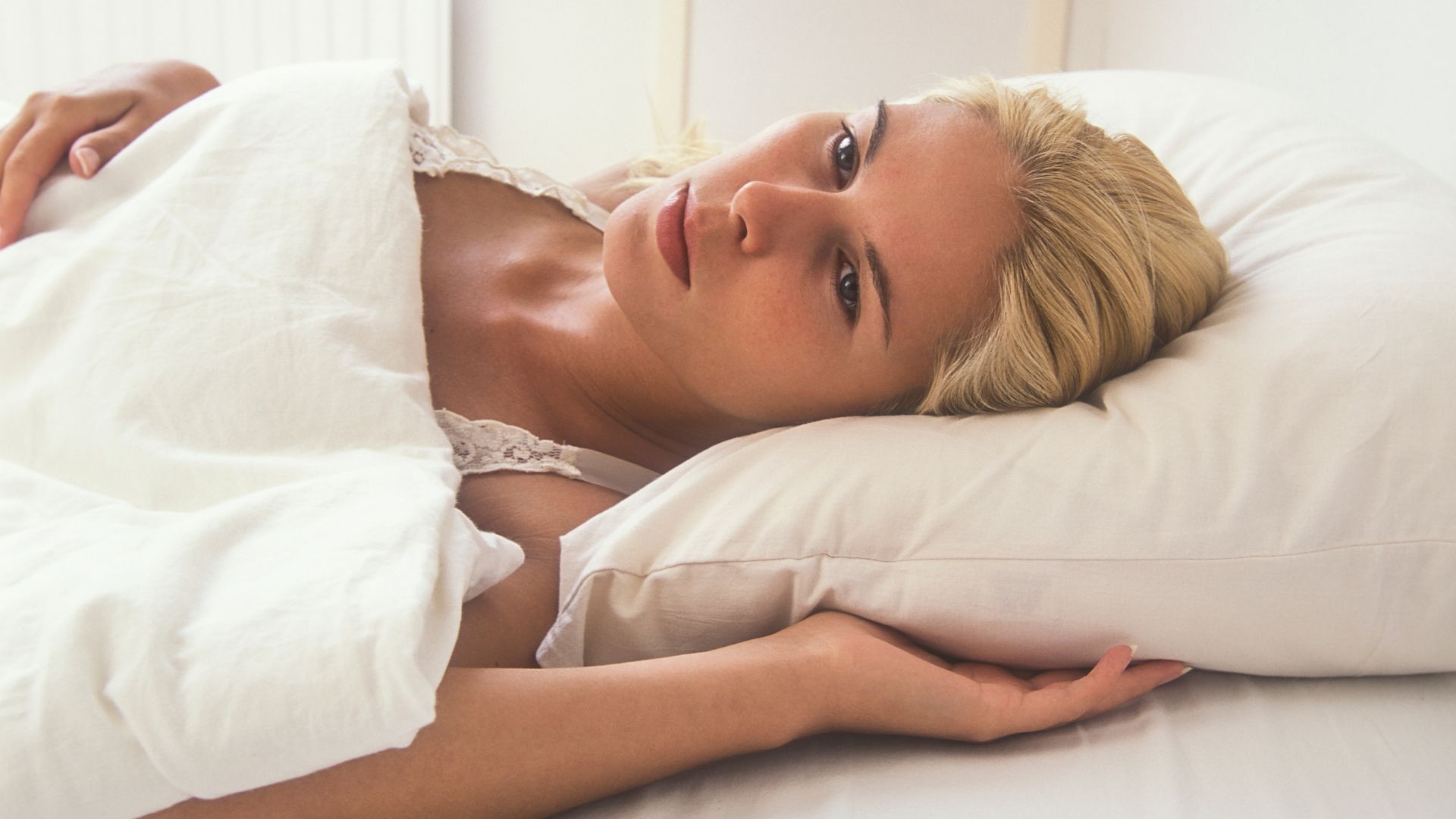
Share
In this Article
Key Takeaways
| Topic | Summary |
|---|---|
| Perimenopause and Menopause | Natural phases in a woman’s life; significant challenges in sleep and emotional well-being. |
| Insomnia During Perimenopause | Hormonal imbalance disrupts sleep; symptoms include difficulty falling asleep, night awakenings, hot flashes. |
| Mood Swings and Emotional Challenges | Hormonal fluctuations lead to mood swings, depression, anxiety; coping strategies include mindfulness, CBT. |
| Circadian Rhythms and Sleep Timing | Hormonal changes disrupt sleep-wake cycles; maintaining regular sleep schedule is crucial. |
| Mindfulness and Relaxation Techniques | Practices such as meditation, deep breathing, and PMR promote emotional balance and better sleep. |
| Nutrition and Sleep-Boosting Foods | Certain foods support sleep quality; avoid heavy meals, caffeine, and alcohol before bedtime. |
| Chronotype Variability | Individual sleep-wake patterns; aligning sleep habits with natural rhythms improves sleep quality. |
| Alternative Therapies | Acupuncture, aromatherapy, herbal supplements offer relief; consult healthcare provider for safety. |
| Sexual Health and Intimacy | Hormonal changes affect sexual health; communication, self-care, and professional guidance are vital. |
| Statistics and Additional Resources | Insomnia prevalence during perimenopause; resources for further information and support. |
Perimenopause and menopause are natural phases in a woman’s life, but they can bring about significant challenges, especially when it comes to sleep and emotional well-being. As someone who has dedicated my career to holistic well-being, I understand the struggles many women face during this time. In this article, I’ll guide you through the complexities of managing insomnia, mood swings, and anxiety during perimenopause, Offering practical tips and expert insights to help you through this transformative phase with grace and resilience.
Perimenopause and Menopause: A Brief Overview
Perimenopause marks the transition leading up to menopause, typically occurring between the ages of 45 and 55. During this phase, estrogen and progesterone levels fluctuate, triggering various physical and emotional changes. By around age 55, most women have officially entered menopause, signaling the end of their menstrual cycle.
Insomnia During Perimenopause and Menopause
Insomnia, often considered a hallmark symptom of perimenopause and menopause, can significantly disrupt a woman’s quality of life during this transitional phase. As estrogen and progesterone levels fluctuate, they can wreak havoc on the body’s delicate balance, leading to sleep disturbances that range from difficulty falling asleep to waking up frequently throughout the night. In this section, we’ll take a closer look at the challenges of dealing with insomnia during perimenopause and menopause, examining its causes, symptoms, and possible treatment approaches.
Hormonal Imbalance: The Culprit Behind Sleepless Nights

One of the primary contributors to insomnia during perimenopause and menopause is hormonal imbalance. Estrogen and progesterone, the two key hormones that regulate the menstrual cycle, also play crucial roles in sleep regulation. As levels of these hormones decline during perimenopause, the body’s internal clock can become disrupted, leading to difficulties in falling and staying asleep.
Symptoms of Insomnia:
Insomnia manifests in various ways during perimenopause and menopause, making it essential to recognize its many symptoms:
- Difficulty Falling Asleep: Many women experience restlessness and racing thoughts, making it challenging to transition into sleep.
- Middle-of-the-Night Insomnia: Waking up in the wee hours of the morning and struggling to fall back asleep is a common occurrence, leaving women feeling fatigued and irritable during the day.
- Hot Flashes and Night Sweats: Vasomotor symptoms, such as hot flashes and night sweats, can disrupt sleep patterns, causing frequent awakenings throughout the night.
Treatment Options:
While managing insomnia during perimenopause and menopause can feel like an uphill battle, several treatment options are available to help women reclaim their sleep:
- Hormone Replacement Therapy (HRT): Hormone supplements, such as estrogen and progesterone, can help alleviate menopausal symptoms and improve sleep quality. However, it’s essential to discuss the potential risks and benefits with a healthcare provider before starting HRT.
- Sleep Hygiene Practices: Adopting good sleep hygiene habits, such as maintaining a consistent sleep schedule, creating a relaxing bedtime routine, and optimizing the sleep environment, can significantly improve sleep quality.
- Cognitive Behavioral Therapy for Insomnia (CBT-I): CBT-I is a structured program that helps individuals address negative thought patterns and behaviors that contribute to insomnia. It focuses on developing healthy sleep habits and addressing underlying psychological factors that may be affecting sleep.
- Alternative Therapies: Complementary approaches, such as acupuncture, aromatherapy, and herbal supplements, may offer relief from insomnia symptoms. While research on their effectiveness is ongoing, many women find these modalities helpful in managing sleep disturbances.
Mood Swings and Emotional Challenges
Perimenopause and menopause are not only characterized by physical changes but also by significant shifts in mood and emotional well-being. Fluctuating hormone levels can wreak havoc on neurotransmitters and brain chemistry, leading to mood swings, irritability, and heightened emotional sensitivity. In this section, we will explore the emotional rollercoaster that many women experience during this transitional phase and discuss strategies for coping with mood swings and emotional challenges.
Understanding the Emotional Landscape of Perimenopause and Menopause
The hormonal fluctuations that accompany perimenopause and menopause can impact various aspects of mental health, including mood regulation, stress response, and emotional resilience. As estrogen levels decline, serotonin and dopamine levels may also be affected, leading to changes in mood and emotional stability. Additionally, sleep disturbances and physical discomfort, such as hot flashes and night sweats, can exacerbate feelings of irritability and emotional distress.
Depression: One of the most prevalent mental health challenges during perimenopause and menopause is depression. Symptoms of depression can range from persistent feelings of sadness and hopelessness to changes in appetite, sleep disturbances, and difficulty concentrating. Postpartum depression, which occurs during or after pregnancy, can also resurface during perimenopause, adding an additional layer of complexity to the emotional landscape.
Anxiety and Panic: Anxiety and panic symptoms may intensify during perimenopause and menopause, fueled by hormonal fluctuations and existential concerns about aging and identity. Women may experience racing thoughts, muscle tension, and an overwhelming sense of dread that interferes with daily functioning. Panic attacks, characterized by sudden and intense fear accompanied by physical symptoms such as chest pain and shortness of breath, can further compound feelings of anxiety and distress.
Irritability and Anger: Irritability and anger are common emotional responses to the hormonal upheaval of perimenopause and menopause. Disruptive Mood Dysregulation Disorder (DMDD), characterized by frequent and severe outbursts of anger disproportionate to the situation, may manifest in some women, exacerbating interpersonal conflicts and straining relationships. Understanding the underlying physiological factors contributing to irritability can help women manage their emotions more effectively.
Coping Strategies for Mood Swings and Emotional Challenges
While dealing with mood swings and emotional challenges during perimenopause and menopause can be overwhelming, there are several strategies that can assist women in coping more effectively:
- Mindfulness and Relaxation Techniques: Practices such as deep breathing exercises, progressive muscle relaxation, and guided imagery can help calm the mind and reduce stress levels, promoting emotional balance and resilience.
- Cognitive Behavioral Therapy (CBT): CBT is a therapeutic approach that helps individuals identify and challenge negative thought patterns and behaviors, offering practical strategies for managing stress, anxiety, and depression.
- Social Support and Connection: Seeking support from friends, family, or support groups can provide validation, empathy, and practical advice for coping with mood swings and emotional challenges. Connecting with others who are going through similar experiences can reduce feelings of isolation and loneliness.
- Healthy Lifestyle Habits: Prioritizing self-care activities such as regular exercise, nutritious diet, adequate sleep, and stress management can support overall emotional well-being and resilience during perimenopause and menopause.
Circadian Rhythms and Sleep Timing
Circadian rhythms and sleep timing play a crucial role in perimenopausal insomnia, as hormonal fluctuations can disrupt the body’s internal clock, leading to irregular sleep patterns. During perimenopause, changes in estrogen and progesterone levels can influence the timing of sleep onset and duration, making it challenging to maintain consistent sleep-wake cycles.
This disruption can manifest as difficulty falling asleep, waking up frequently during the night, or experiencing early morning awakenings. Maintaining a regular sleep schedule, even on weekends, becomes paramount to support the body’s natural circadian rhythm and promote better sleep quality. By aligning sleep timing with the body’s internal clock, individuals can enhance their overall sleep hygiene and mitigate the impact of hormonal changes on their sleep patterns during the perimenopausal transition.
Mindfulness and Relaxation Techniques

In the midst of the hormonal fluctuations and emotional rollercoaster of perimenopause and menopause, finding moments of calm and tranquility becomes paramount. Mindfulness and relaxation techniques offer powerful tools to soothe the mind, alleviate stress, and promote emotional balance during this transformative phase of life. In this section, we explore the advantages of mindfulness practices and relaxation techniques, examining how they can help women in facing the challenges of perimenopause and menopause with increased ease and resilience.
Understanding Mindfulness
At its core, mindfulness involves paying attention to the present moment with openness, curiosity, and acceptance. By tuning into our thoughts, emotions, and bodily sensations without judgment, we can cultivate a deeper awareness of our inner experiences and respond to life’s challenges with greater clarity and equanimity. Mindfulness practices, such as meditation, deep breathing exercises, and body scans, offer simple yet profound ways to anchor ourselves in the present moment and cultivate a sense of inner peace and resilience.
The Benefits of Mindfulness for Perimenopause and Menopause
- Stress Reduction: Mindfulness techniques help activate the body’s relaxation response, counteracting the effects of stress hormones such as cortisol and adrenaline. By fostering a sense of calm and relaxation, mindfulness practices can alleviate stress-related symptoms such as anxiety, irritability, and insomnia.
- Emotional Regulation: Mindfulness cultivates emotional awareness and self-regulation, allowing women to observe their thoughts and feelings without becoming overwhelmed by them. By developing greater emotional resilience, women can navigate mood swings and emotional fluctuations with greater ease and equanimity.
- Improved Sleep Quality: Mindfulness-based interventions have been shown to improve sleep quality and reduce insomnia symptoms by promoting relaxation and reducing rumination and worry. By incorporating mindfulness practices into their bedtime routine, women can cultivate a sense of inner calm and ease that promotes restful sleep.
- Enhanced Well-being: Regular mindfulness practice has been linked to greater overall well-being, including increased feelings of happiness, contentment, and inner peace. By fostering a deeper connection with themselves and the world around them, women can navigate the challenges of perimenopause and menopause with greater resilience and grace.
Exploring Relaxation Techniques
In addition to mindfulness practices, relaxation techniques offer effective ways to soothe the body and calm the mind during perimenopause and menopause:
- Deep Breathing Exercises: Deep breathing exercises, such as diaphragmatic breathing and square breathing, help activate the body’s relaxation response and promote feelings of calm and relaxation. By focusing on slow, deep breaths, women can reduce stress, lower blood pressure, and promote emotional well-being.
- Progressive Muscle Relaxation (PMR): PMR involves systematically tensing and relaxing different muscle groups to release tension and promote relaxation. By practicing PMR regularly, women can alleviate muscle tension, reduce physical discomfort, and promote overall relaxation and well-being.
- Guided Imagery: Guided imagery involves visualizing peaceful and calming scenes to promote relaxation and reduce stress. By immersing themselves in a vivid and sensory-rich mental landscape, women can create a sense of inner calm and tranquility that carries over into their daily lives.
Incorporating Mindfulness and Relaxation into Daily Life
To reap the full benefits of mindfulness and relaxation practices during perimenopause and menopause, it’s essential to integrate them into daily life in meaningful and sustainable ways:
- Create a Daily Practice: Set aside time each day to engage in mindfulness meditation, deep breathing exercises, or other relaxation techniques. Even just a few minutes of practice each day can yield significant benefits for emotional well-being.
- Practice Mindful Awareness: Cultivate mindfulness in everyday activities, such as eating, walking, and washing dishes. By bringing mindful awareness to the present moment, women can infuse their daily lives with a sense of presence, gratitude, and aliveness.
- Be Gentle with Yourself: Approach mindfulness and relaxation practices with an attitude of self-compassion and acceptance. Embrace imperfection and allow yourself to simply be with whatever arises, without judgment or self-criticism.
- Seek Support and Guidance: Consider joining a mindfulness group or attending a meditation class to connect with others who share your journey. Alternatively, seek out online resources, books, or apps that offer guidance and support for integrating mindfulness and relaxation into your life.
Nutrition and Sleep-Boosting Foods

Nutrition and sleep-boosting foods are essential considerations for managing insomnia during perimenopause and menopause. Certain dietary choices can positively impact sleep quality by promoting relaxation and supporting hormonal balance. Incorporating magnesium-rich foods like pumpkin seeds and dark chocolate into your diet can help relax muscles and improve sleep.
Additionally, foods rich in tryptophan, such as turkey, dairy, and bananas, can enhance serotonin production, promoting better mood and sleep. Omega-3 fatty acids found in fatty fish like salmon and flaxseeds may also aid in regulating sleep patterns. It’s crucial to avoid heavy meals, caffeine, and alcohol close to bedtime, as they can disrupt sleep. By focusing on a balanced diet rich in sleep-promoting nutrients and avoiding stimulants, individuals experiencing perimenopausal insomnia can better support their sleep health and overall well-being.
Chronotype Variability
Chronotype variability refers to the individual differences in sleep-wake patterns and preferences among people, which are largely influenced by genetic and environmental factors. Understanding your chronotype, whether you’re a morning person, night owl, or somewhere in between, can be particularly beneficial during perimenopause and menopause when sleep patterns may become disrupted.
While some individuals naturally feel more alert and energetic in the morning, others may feel more productive and awake during the evening hours. Recognizing and respecting your chronotype can help you optimize your sleep schedule to align with your body’s natural rhythms, ultimately promoting better sleep quality.
For example, if you’re a night owl experiencing perimenopausal insomnia, adjusting your bedtime routine and sleep environment to accommodate your natural tendency to stay up later may help improve sleep onset and duration. Conversely, morning persons may find it beneficial to prioritize earlier bedtimes and establish consistent wake-up times to support their natural sleep-wake cycle. By embracing your unique chronotype and adapting your sleep habits accordingly, you can enhance your overall sleep quality and well-being during perimenopause and beyond.
Alternative Therapies and Complementary Approaches
Alternative therapies and complementary approaches offer additional avenues for managing the symptoms of perimenopause and menopause beyond conventional treatments. These modalities encompass a wide range of practices, including acupuncture, aromatherapy, and herbal supplements like valerian root or chamomile. While conventional treatments such as hormone replacement therapy (HRT) are well-established, many women find relief from alternative therapies that focus on holistic well-being. For example:
Acupuncture: a key component of traditional Chinese medicine, involves the insertion of thin needles into specific points on the body to alleviate symptoms and promote balance.
Aromatherapy: utilizes essential oils derived from plants to address various symptoms, such as lavender oil for relaxation and peppermint oil for headaches.
Herbal supplements: such as black cohosh or red clover, are often used to alleviate hot flashes and night sweats.
It’s essential to approach alternative therapies with caution and consult with a healthcare provider to ensure safety and efficacy, especially when integrating them with other treatments. While these approaches may not be suitable for everyone, they can provide valuable options for managing perimenopausal symptoms and improving overall well-being.
Sexual Health and Intimacy
During perimenopause and menopause, sexual health and intimacy can be affected by hormonal changes, leading to symptoms like vaginal dryness and decreased libido. Effective communication with partners is crucial for addressing these changes, and trying out new forms of intimacy can help maintain connection. Seeking professional guidance and incorporating self-care practices can support overall well-being and satisfaction in sexual life during this phase.
Statistics and Additional Resources
According to Medical News Today, 26% of individuals experiencing perimenopause and menopause report insomnia that significantly impacts their daily activities. The prevalence of sleep disorders varies across menopausal stages, ranging from 16–42% during premenopause to 35–60% postmenopause.
For further information and support, consider exploring the following resources:
Recommended Service
FAQ
Perimenopause-related insomnia can manifest in various ways, including difficulty falling asleep, waking up frequently throughout the night, and experiencing early morning awakenings. Additionally, women may struggle with hot flashes and night sweats, which can disrupt sleep patterns and contribute to insomnia symptoms during perimenopause.
Perimenopause can disrupt sleep patterns due to hormonal fluctuations, particularly changes in estrogen and progesterone levels. These hormonal shifts can affect the body’s internal clock, leading to difficulties falling asleep, staying asleep, and achieving restorative sleep. Additionally, symptoms such as hot flashes and night sweats can further disrupt sleep patterns and contribute to insomnia during perimenopause.
There are several effective coping strategies for managing insomnia during perimenopause, including practicing good sleep hygiene, maintaining a regular sleep schedule, and creating a relaxing bedtime routine. Other strategies include incorporating relaxation techniques such as deep breathing exercises, mindfulness meditation, and progressive muscle relaxation. Additionally, avoiding caffeine and alcohol close to bedtime and creating a comfortable sleep environment can help promote restful sleep during perimenopause.
Hormone replacement therapy (HRT) may help alleviate perimenopausal insomnia by restoring hormonal balance and addressing symptoms such as hot flashes and night sweats. However, HRT is not suitable for everyone and may carry risks and side effects. It’s essential to discuss the potential benefits and risks of HRT with a healthcare provider to determine if it’s the right treatment option for managing perimenopausal insomnia.
Yes, several natural remedies may help manage perimenopausal insomnia, including herbal supplements, dietary changes, and lifestyle modifications. For example, herbal supplements such as valerian root, passionflower, and melatonin have been shown to promote relaxation and improve sleep quality. Additionally, incorporating relaxation techniques, maintaining a healthy diet, and engaging in regular exercise can also support better sleep during perimenopause. It’s essential to consult with a healthcare provider before starting any new supplement or treatment regimen.
Conclusion
Managing insomnia, mood swings, and anxiety during perimenopause can be challenging, but with the right strategies and support, you can effectively address these symptoms and embrace this transformative phase of life with resilience and vitality. Remember to prioritize self-care, seek professional help when needed, and rely on your support network for guidance and encouragement. Together, we can navigate perimenopause with grace and empowerment.
Self-care is an essential aspect of my philosophy, and it’s why I have created products such as my Essential Mist. This invigorating mist is composed of a White Tea and Rosewater base with a reparative blend of Prebiotics and East Asian Medicinal plants of Ginseng and Tremella, which helps combat stress, dehydration, and fatigue. Additionally, I offer consultations for those who are looking to further prioritize their self-care and wellness journey.






